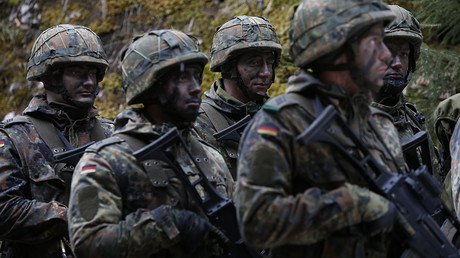UK out of the way? Germany seeks closer military ties within EU after Brexit, boosts own army
Berlin and Paris will push for closer military ties with EU member states, the German defense minister said, adding that the long-contended issue was let loose by UK’s vote to leave the bloc. It comes as Germany is looking for a new global role for its military.
“For a long time we’ve been looking back at the UK because it repeatedly told us it did not want to do such things,” German Minister of Defense Ursula von der Leyen said on Wednesday, as quoted by Reuters.
Von der Leyen said that London’s position “paralyzed the European Union on the issues of foreign and security policy.” This issue is apparently no more, as the UK voted to leave the EU in the June 23 referendum.
READ MORE: From partner to rival: Germany to designate Russia 'a security challenge' – report
“This cannot mean that the rest of Europe remains inactive, but rather we need to move forward on these big issues,” she added. The minister also brought up the idea of a European “civilian-military headquarters,” which would oversee the global deployment of EU military forces as well as medical personnel.
Larger army, military budget for Germany
Von der Leyen made her statement while presenting a new military roadmap for Germany, a so-called White Paper, which has been branded a part of the “paradigm shift” for the country.
According to the document, Germany will significantly build up its military personnel.
An additional 20,000 troops are set to be enlisted into the German army (Bundeswehr) over the next seven years, Deutsch Welle reported.
READ MORE: Europe needs united army, EU parliament committee head urges after Brexit
The announced enlargement is part of a policy shift by the German government adopted in Wednesday’s document. It sees Berlin assuming a greater role in dealing with global challenges.
“Germany is a highly globally connected country which is due to its economic, political and military importance, but also in terms of its vulnerability, bears the responsibility to actively participate in the global order,” says the paper as quoted by the German outlet Die Welt.
For decades Germany has refrained from being a major player in regards to defense due to the country’s Nazi militarist past. However now the document says that Berlin is ready to “assume responsibility” and “help meet current and future security and humanitarian challenges.”
From now on, the army could be used to tackle security threats inside the state, such as in case of a major terror attack, Der Spiegel reports.
One of the key parts of the White Paper includes more financial backing for the military forces. “The financial framework must allow the Bundeswehr to fulfill its obligations towards a growing range of tasks and the alliance requirements,” reads the draft document obtained by the German TAZ. Therefore “it is required to match the resources needed by the Bundeswehr to their obligations.”
The boost in military spending has meanwhile come under fire from some German lawmakers. “The White paper is not honest where funding is concerned. It would have been better to prioritize our goals and to define what we can do properly – and what we simply cannot afford,” said Rainer Arnold, parliamentary defense spokesperson for the Socialist Democratic Party as quoted by Deutsche Welle. Currently Berlin is assuming a non-combat role in the fight against Islamic State (formerly known as IS, ISIS/ISIL) with some 250 troops and six tornado jets stationed in Turkey.
A potential “Russian threat” has also found its way into the White Paper.
“Without fundamental change of its course, Russia will constitute a challenge to the security of our continent in the foreseeable future,” the paper reads as quoted by Die Welt. The document goes on saying that Germany needs a dual approach towards Russia: “This consists of credible deterrence and defense ability, and the willingness to engage in dialogue.”
READ MORE: Only 9% of Germans back NATO buildup in Eastern Europe – poll
During this month’s NATO summit in Warsaw, Berlin said it would commit troops to rotating battalions that the alliance will station in the Baltic States and Poland to deter what it believes to be “Russian aggression.” The move was slammed by the German Foreign Minister Frank Walther Steinmeier. Rather than inflaming the situation further “through saber-rattling and warmongering,” there ought to be more space for dialogue and cooperation with Moscow, Steinmeier said.













